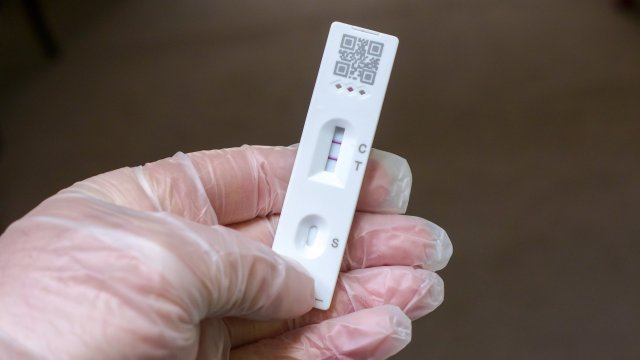Infection
Masks and social distancing did reduce Covid infections, Royal Society report shows
Measures taken during the Covid-19 pandemic such as lockdowns, social distancing and wearing face masks “unequivocally” reduced the spread of infections, a new report has found.
Experts looked at how effective non-pharmaceutical interventions (NPIs) – not drugs or vaccines – were when applied in packages that combine a number of measures that complement each other.
The Royal Society report, called Covid-19: Examining the effectiveness of non-pharmaceutical interventions, reviewed the evidence gathered during the pandemic for six groups of NPIs and their effectiveness in reducing transmission. These included masks and face coverings, social distancing and lockdowns, test, trace and isolate, travel restrictions and controls across international borders, environmental controls, and communications.
When assessed individually, there was positive – if limited – evidence of transmission reduction from many of the NPIs used in the pandemic, the review found. However, evidence of a positive effect was clear when countries used combinations of NPIs.
Additionally, evidence showed NPIs were most effective when the intensity of transmission was low, supporting their use early in a pandemic and at first sign of resurgence.
During the early stages of responding to an emerging infectious disease, NPIs tend to be the only controls available before the development of drug treatments and vaccines. However, as was seen around the world during the pandemic, their use can have adverse personal, educational and economic consequences – making assessment of their effectiveness essential.
Professor Sir Mark Walport, foreign secretary of the Royal Society and chairman of the report’s expert working group, said: “There is sufficient evidence to conclude that early, stringent implementation of packages of complementary NPIs was unequivocally effective in limiting Sars-CoV-2 infections.
“That does not mean every NPI was effective in every setting, or at all times, but learning the lessons from the wealth of research generated in this pandemic will be key to equipping ourselves for the next one.”
The review found social distancing and lockdowns were the most effective category of NPIs. The more stringent the measures were the greater the effect they had, the experts found.
For the future, the report recommends establishing international protocols for conducting clinical trials and observational research on NPIs in advance of further pandemics.
Professor Chris Dye, professor of epidemiology at the University of Oxford, said: “The next thing is Disease X as the World Health Organisation has called it. We don’t know what it’s going to be, we don’t know where it’s going to appear.
“So we need a system which is generic enough in character to handle anything of that kind, and for me, the number one priority is to have a global system of surveillance response.”
The new report draws together the findings of six expert-led evidence reviews, published in a special themed issue of the journal Philosophical Transactions of the Royal Society. The reviews looked at thousands of published studies, and identified papers that were suitably robust for inclusion in each review category.
Dr Michelle Kendall, Research Fellow at the University of Warwick’s Department of Statistics, said: “This is a welcome reminder of the fact that, during challenging times, the significant efforts of individuals were key in fighting the virus and should be acknowledged.
“Special thanks should be reserved for all the people who engaged with these NPIs, particularly those targeted NPIs like testing and tracing which helped relieve our reliance on blanket emergency measures like social distancing and lockdowns. There should be a long-term focus on fostering public trust as a key ingredient of most NPIs presented in the review.”

